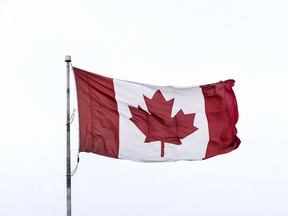About half of the respondents polled (48 per cent) say they will replace any item that has a substitute
Article content
Amid the threat of a tariff war, an overwhelming majority of Canadians (85 per cent) say they plan to — or already do — replace American products when shopping, according to a new poll from the Angus Reid Institute.
The results show that about half of the respondents polled (48 per cent) say they will replace any item that has a substitute, while 37 per cent plan to replace items when they can find something that is a similar price and quality.
Advertisement 2
Article content
Among the folks who want to make a change, 98 per cent of them say they look for the “Made in Canada” label when they shop for food.
The poll was conducted from Feb. 16 to 18, two weeks after U.S. President Donald Trump and Prime Minister Justin Trudeau agreed on a delay for the imposition of tariffs. Despite the 30-day reprieve, the pollster found Canadian shoppers have decided to “change their consumer habits to support domestic producers” in advance of any tariffs come into effect.
“It’s a very significant response to what’s going on,” said Jennifer Birch, managing director for the Angus Reid Group. “When we see changes in policy, when we see things going on, oftentimes it changes people’s behaviours.”
Overall, the poll results show that four in five Canadians are committed to buying domestic products, while three in five say they want to boycott American products.
When looking at individual provinces, Quebecers and Atlantic Canadians were the most eager to replace American products with Canadian ones.
After B.C., Manitoba, Nova Scotia, Ontario and Prince Edward Island removed American liquor from their shelves earlier this month as a response to the threatened U.S. tariffs, half of Canadians said they would buy more Canadian-made alcohol.
Article content
Advertisement 3
Article content
Online shopping giant Amazon could also suffer an economic blow as Canadian shoppers look to change their buying habits.
Amazon accounts for 40 per cent of all online sales in Canada, according to data from 2023. But two in five Canadians say they are looking to buy online products elsewhere or slow their use of the site because of Trump’s tariff threat.
One in five Canadians surveyed also said they plan on cancelling American streaming services, which include Amazon Prime, Disney+ and Netflix.
Male respondents ages 35 to 54 as well as current Conservative Party supporters (both 28 per cent) are most likely to say they won’t make any changes in their shopping habits, compared to 15 per cent of naysayers among the general population.
Birch points to shopping demographics as the basis for this gap. “I think one of the things, when we look at who is making the biggest changes in terms of shopping habits, is to remember that oftentimes women tend to be primary decision makers on shopping choices.”
“In your typical household, it tends to be mom that’s doing the grocery shopping, and we see that grocery shopping is the biggest category where we’re seeing changes.”
Advertisement 4
Article content
Besides shopping and online streaming, the poll found that Canadians are making other spending changes. Half the respondents said they plan to delay or cancel their trips to the U.S. Canadian airlines and travel companies are already feeling the effect of this change in travel habits, according to Angus Reid.
Birch said these changes reflect economic uncertainty as well as newfound Canadian pride.
“There’s a lot of uncertainty about the economic future of Canada right now….So some of this could be tied to simply not making big decisions to spend money on leisure when we’re not sure what’s going to happen to the economy when the tariffs go ahead,” she said.
She also points to pride in Canada and “a desire to keep that money invested in the Canadian economy and Canadian travel and tourism.”
A quarter of Canadians also have or plan to get on social media to make comments in support of Canada.
This poll was conducted online among a representative randomized sample of 3,310 Canadian adults who are members of the Angus Reid Forum. For comparison purposes, a probability sample of this size would carry a margin of error of plus or minus 1.5 percentage points, 19 times out of 20.
Recommended from Editorial
Our website is the place for the latest breaking news, exclusive scoops, longreads and provocative commentary. Please bookmark nationalpost.com and sign up for our daily newsletter, Posted, here.
Article content









